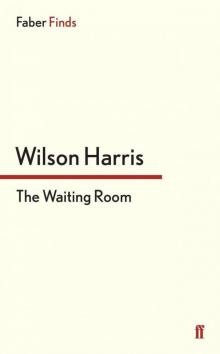- Home
- Wilson Harris
Black Marsden Page 7
Black Marsden Read online
Page 7
The wind blew a straggling portrait of leaves towards him. A taxi was approaching.
“Taxi. Taxi.”
He was whirled over the bridge to the dying chorus of Harp’s unearthly bagpipes.
9
Goodrich had not been in contact with his visitors for some days after the narrow shave he had had on the Dean Bridge but descending from the rock garden in the Edinburgh Botanical Gardens he came almost face to face with Jennifer. She did not appear to see him. Had she deliberately looked through him and ignored him as they passed each other, or was it a genuine distraction which possessed her and made her blind to him at that moment?
His invisibility was embarrassing. He wondered whether he had offended her that morning when she came into the sitting-room in her beauty pack. He had spoken tactlessly perhaps and left the room rather unceremoniously.
Weeks, months had passed—from late winter into summer—over which time he had taken Black Marsden, Jennifer and Knife into his house, FEED MY SHEEP, he thought wryly: the most potent assembly of god’s sheep he could recall—lives that seemed more real than any body of fictions or matching ruses to his inner book, inner diary. No wonder tempers flared every now and then.
Now this morning, for example, had Jennifer deliberately ignored him? On the other hand he was prepared to give her the benefit of the doubt in his mind—she had been preoccupied as they passed each other. Another thing, having been reduced to the state of a ghost by her, he was comprehensively aware of her—her figure, clothing, gait etc. Some purgatorial necessity perhaps.
It amused him in this context to draw a kind of cartoon of himself run over by the car on the Dean Bridge so that the idea of his ghostliness and invisibility could become comical and relieve him of embarrassment. Thus his comprehensive awareness of her became concretely intuitive and curiously supernatural. She seemed to glow this morning with father sun rather than mother earth whom he had seen plastered on her not so long ago in his sitting-room.
Now, when they came upon each other, she was walking hand in hand with a man he did not know. He had so confidently expected her to stop and introduce her companion that he was smiling even before she came abreast of him. Then as he passed he realized she may have been wholly absorbed by something the man was saying. It had been a shock when she cut him dead but the comical absurdity of being a ghost cushioned the shock into the humour of invisibility. And furthermore he was provided with a chance to look more closely at her companion who became an additional agent in the comprehensive portrait he had begun to paint of her.
This man wasn’t the pale young rider with whom he had seen her in the Royal Mile not very long ago. This was a somewhat older man, down-to-earth looking and wearing solid spectacles, a much more robust man all in all; the air, in fact, of a manual worker, an out-of-doors man. Robust as he was, however, he shared an unmistakable feature with the other man (the pale young rider).
It was a depressed feature. Robust as he was he lacked authority. Physical as he was, he seemed devitalized economically, beaten into shape by a kind of perennial regional hammer, the hammer of depression. Solid as he was he appeared depleted of both a will-to-power and a will-to-revolution.
He seemed as unsuitable for Jennifer as the pale young rider had been. Perhaps they were brothers in this feature or respect—one a curious eunuch of spirit (depleted of spiritual authority), the other a curious eunuch of politics (depleted of revolutionary authority).
This kinship between them made Goodrich conscious with renewed strangeness and sharpness of Marsden’s phenomenon of personality. In some subconscious degree beyond her apparent apprehension Jennifer was so subject to him—to his ironies and powers—that her men turned into substitutes of her unfulfilled longing for him….
As this resentment against Marsden grew and this tide of feeling—this passion for Jennifer swept through him—he was on the point of calling after her but it was too late: they had already turned a corner in the road. And he was left with a desolation, the hollow cue or strangeness of living lives, living other lives as well as one’s own. The desire mounted in him to strike Marsden; to set Jennifer free. It was an irrational dream, parasitic as well as violent, but it took his breath away as upon a rare self-deceiving plateau, tabula rasa assassin or murderer.
He began to walk across a stretch of grass towards a large cedar overlooking a stream or pond. There was a bench upon which he sat, and reflected upon the nature of invisibility. He opened his book and scanned the pages.
Was invisibility a bonfire whose sparks seared the memory until one party or face or eye of the world lay in shadow, did not see the other party and yet in unselfconscious disarray provided a comprehensive beckoning portrait link by subconscious link?
Was one half of the world’s invisibility an immanent sun of friendship within the globe—like Harp and Goodrich who when they met for the first time got on like a house on fire?
Was invisibility a ghost town, a ghost culture, a ghost landscape, an unmasking of schizophrenic premises?
Was invisibility the slate of birth or the slate of death, the mask of love or the mask of hate?
Moveable squares on a chessboard, thought Goodrich, aroused all at once by the spectre of infinity—by his own cartoon of ghostliness—to look far and deep into the spaces he had attempted to bridge in his journeys around the globe. First he needed to revisualize (and revise) his journey across Namless….
*
“What do you hope to find?” asked Knife, who drove him on a rickety road in a rickety taxi through blistering mountains towards the Town of Namless. This Knife was brown and more talkative than the others but he belonged to the same family as black Jamaican Knife and Marsden’s white purgatorial Knife.
“What are you looking for?” Brown Knife repeated.
“I was born here in Namless,” said Goodrich waving his hand at the ribbon of road which seemed to undulate here and there like a stylized path through a sea of land blown into long crests and troughs by subterranean storms. “I remained here until I was one year old when my father, an American engineer, died. My mother re-married in Scotland and we returned—she and my stepfather and I—when I was five years old. Square Five. Age Five.”
“Square Five? Age Five?” Knife was puzzled.
“Oh my stepfather disappeared in Brazil when I was five,” said Goodrich in laconic explanation. “My mother and I remained for a year or two at Namless trying to learn all we could. But it was impossible to get all the facts. There were all sorts of rumours. A rumour, for example, that he had deliberately dropped out.” He stopped and Knife gave a sharp nod. “We had to leave in the end,” Goodrich continued. “It was an unhappy time. Perhaps that is why I have come back. To try and sort out something, something oppressive.” He paused. “I was six or seven years old when we left. It’s a long time, a long time ago. And Namless looks like another country.”
“You have returned to another country,” Knife agreed. “And yet I would say it’s a country which has been ripening for you over all these years. There’s a country (perhaps just a village or a dot on the map) which is ripening for each or every man if he could find it. As a particular war or a particular revolution ripens into one man’s scene. He becomes So-And-So the Great. Nothing here at Namless goes around in a circle. Everything is turning inside/out.”
“Marsden the Great,” Goodrich muttered, so softly he wondered whether Knife had heard.
The blistering range of mountains was beginning to fall far behind and the ground which swept away now from the road looked cooler all of a sudden and greener. “As you can see,” said Knife, pointing to abandoned farm lands, “every house hereabouts appears deserted.”
Goodrich stared into the distance towards ripening signposts marked TROPICAL, others MEDITERRANEAN. A new and distant range of mountains, loftier than anything he recalled seeing before, began to appear and to glisten with snow. Incredible, thought Goodrich. Snow far up. Here below we are in the tropics.
&nbs
p; They were passing more houses, as deserted-looking as ever, broken and smashed.
“There was an uprising,” Knife explained. “Crushed at a blow.”
“But … but … where are they … the people?”
Knife did not say except to wave his hand and exclaim: “There was a strike in Namless Town. That came a year or so afterwards.”
Now all of a sudden, as if with a wave of a wand, Goodrich was struck by a fantastic assembly of features—to which he already possessed a prelude on the rickety road or ribbon of sea across which Knife drove—features which may have been plucked from the loneliest reaches of the Highlands of Scotland like transplanted snow from the Cairn Gorms to the Cordillera Real in the Bolivian-Peruvian Andes which reach to Lake Titicaca on one hand, but on the other descend phenomenally to the Amazon basin. Such a spectre in which blister turns cool, ice beckons to fire, snow to rainforest was a family tree of contrasting elements.
As far as eye could see it may have been carved or erected as a vast nameless cradle by a refugee chorus of mankind dispersed from Pole to Pole, who celebrated within this mosaic overlapping features of their original heartlands: When the bough breaks, the cradle will fall.
Or it may have been borrowed from diverse peoples and inhabitants (stretching back into Pre-Columbian mists of time) who had been shepherded out of sight in order to create a theatre of infinity.
“The Strike at Namless Town,” said Brown Knife, “started with the usual demands—wages, housing and so on. It had been coming for a long time. Many were poorly paid, badly housed; others had experienced discrimination and injustice. Many had not forgotten the way the Authorities had stamped on the uprising the year before. Others were disgusted with a centuries-old pattern of uprising followed by repression, the old rat-race of history as day follows night. And so once the Strike had taken root in the Town it dragged on and on. Then out of the blue it seemed the Authorities agreed to everything. Higher wages, better housing, everything. An economic hand-out. Imagine that!”
“I see,” said Goodrich. And he stared into Knife’s dead pan face.
“But it was too late,” said Knife. “A week, a month earlier (who knows?) and it may have worked. Perhaps (who knows?) the Authorities may have been in league….”
“What do you mean? In league with whom?”
Knife did not reply but stared across the mimic cradle of exiled men and gods. “You know,” he confessed at last, “it’s a peculiar thing but strikes have been growing more and more into a game of chess in this part of the world. Everybody claims he is being pushed. Nobody ever does the pushing but everybody is being pushed….”
Goodrich suddenly observed on the dashboard of the taxi that they were down to the last gallon of petrol. “What do we do when we run dry?”
Knife grinned. “We set sail. There’s a thundering wind here sometimes that would push this little craft of mine to kingdom come.” He gave Goodrich a half-derisory, half-friendly slap on the shoulder. “You’ll get to Namless Town one day, Mr. Goodrich, never fear. This visit or the next. We must wait and see. There are two petrol stations by the way—one at the ferry on the river where I met you when you arrived, and the other in Namless Town which is our ultimate destination. A lot of country lies between the two—between ferry and Namless Town—and so I always travel with a spare drum of petrol in the back of my cab. You may not believe it, Mr. Goodrich, but this old ramshackle bus gives me forty miles to the gallon.” He had forgotten the enigma of the Namless Strike in recounting or tabulating a body of facts but Goodrich brought it up again.
“Namless,” Knife explained, “is the name of the whole territory as well as the Town. A town and a territory which slowly began to levitate—an archaeological phenomenon.” Knife looked more dead pan than ever as he said this: he may have been rehearsing a scene in which an extraordinary toll of events becomes common-or-garden knowledge. “When the Strike started it was apparently about higher wages etc. etc. When the higher wages were granted (which was in itself a phenomenon, it had never happened before in my lifetime) it was already too late. Namless had sleepwalked itself into another Strike: a Strike against the whole deadly rat-race of things. A kind of risen-up and drop-out at the same time religion.”
Goodrich was hypnotized all at once by Knife’s droning voice in which the sky was the limit. Now it was that a needle of rock in a bizarre rock cluster came into view upon which he discerned a shape…. Was it man or beast in the eye of the needle? … Something climbing … dangling…. Stuck? … Helpless? … Was he dreaming of archaeological or psychic riddles? He wanted to tell Knife but felt embarrassed, inhibited. Knife was looking the other way. A mirage, Goodrich thought, for when he looked away himself and back again, no one appeared to be there. His eyes were dazzled; the taxi descended an incline and the bizarre needle against the sky was temporarily hidden.
“Have a drink,” said Knife offering him a flask from which Goodrich poured himself a cup of reddish liquid. “Go on,” said Knife. “It’s good. It’s Namless beverage.”
Goodrich was thirsty, put the cup to his head and drank. Then he felt a little sick.
“Then it was,” said Knife, “an even stranger thing happened. Instead of troops the Authorities sent to Namless a Director-General of Cosmic Theatre. Imagine that. For centuries they had persecuted every form of strike as an immoral species of drop-out, risen-up thing. But now they were in league….”
Goodrich was stupefied, mopped his eyes. Half an hour ago they had driven through a curious kind of wide chasm. An icy wind had struck his clothing. It was cold then. “It’s hot now,” he said. “Suddenly it’s become hot.” The taste of the Namless beverage lingered in his mouth like a new opium of the masses.
“Do you realize,” said Knife, “that it’s 45 degrees F. in the shadow of some of those rocks over there? Walk a couple of hundred yards or so away, however, into the sun and the thermometer picks up and reads 72 degrees F. It’s about 75 to 80 on this strip of road where we happen to be driving now. Not too hot really.”
“Not too hot,” Goodrich mimicked, mopping his brow. “Your Authorities do have a sense of humour, I must say. What sort of genius is this Director-General who now addresses Namless?”
“Geni-ass of place,” said Knife repeating his dead pan lesson. “Hee-haw. Hee-haw. The sky’s the limit. His voice echoes in the stars. The Strikers in Namless had not dreamt of such a thing as the collaborative echoing repudiation of a whole system of values, the collaborative half-mocking repudiation of a whole way of tasting the world, a collaborative sickening to death of the world in high places and low until it crept up on them unawares. In the way sometimes a whole community suddenly finds it has been pushed—pushed into irrevocable decisions—pushed into extremes—pushed into something it never visualized in the beginning. It’s the whole mysterious aroma of self-judgement, combinations of corruption and establishment, effects of tyranny and revolution, an incalculable league of elements, over-ripening of parts…. Namless was convinced when the Strike started that it knew what its material demands were—real wages etc. Then all of a sudden something ripened in its head—the very palate, the very roof of existence changed. The bray of god became not only the voice of the people but the music of the spheres. Apuleius the Great.”
“There he is,” said Goodrich half-dazzled, half-confused. “I thought I was dreaming but there he is.” There was a long pause as he stared at the pinnacle or needle of rock he had seen before and which now came back into view as Knife’s taxi swung or rattled on its ribbon of road.
“I need to fill up,” said Knife as if he had not heard or had misunderstood Goodrich. “Time for petrol.” He drew up and got out of the car. Goodrich stepped out too, stretched his legs, tried to look elsewhere, think of something other than the climber he had seen. After a while Knife said: “The tank’s full. And I’ve checked on the radiator. We’re ready to go….”
“There’s a man or something or other up there,” Goodrich cried. He spoke w
ith an effort as if the words were torn from his lungs; closed his eyes as if it had been a strain to see. Perhaps it’s the atmosphere, he thought, the place is saturated with depressed memories. Everything’s too rare or too hot. Or perhaps it’s that damned opium. “There’s a creature up there,” he insisted. The words bled in his mouth. “In that needle of rock.” Knife waited like a stone designed by Marsden, a walking stone, a talking instrument, a guide into the future. Goodrich felt sick, a blend of nausea and embarrassment, the taste of robot hallucination. Then Knife cut the air with his hand, spoke softly: “Didn’t you see him before?”
Goodrich opened his eyes. “I saw him a little way back.”
“But you said nothing.”
It was no business of mine, no business of mine at all, Goodrich almost blurted out but he controlled himself and explained: “I wasn’t sure. I wasn’t sure at all.”
“And now?” asked Knife.
“He’s there.”
“Good for you, Mr. Goodrich,” applauded Knife. “It would astonish you if I were to tell you how many people pass through right here in the shadow of this rock and look the other side. As they would on the pavement of a great city when a poor devil drops at their feet.”
“Are you suggesting…?”
“I am suggesting you have scored one for the road, Mr. Goodrich. Good shot, sir,” said Knife. His voice was so riddling and soft it was impossible to tell whether he was stating a fact or recording a miracle of science, a miracle of compassion. “Except that here—unlike a pavement in a great city—here on this road to Namless—the poor devil up there is a rare kind of robot with which the Director-General has begun his experiment.”

 The Waiting Room
The Waiting Room Black Marsden
Black Marsden The Tree of the Sun
The Tree of the Sun Jonestown
Jonestown The Carnival Trilogy
The Carnival Trilogy Palace of the Peacock
Palace of the Peacock